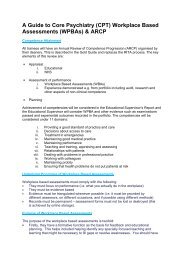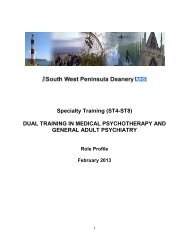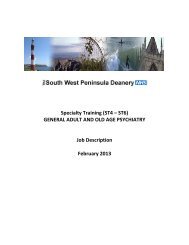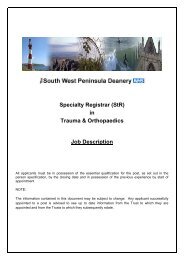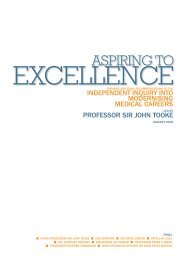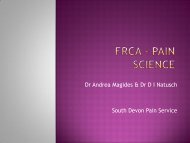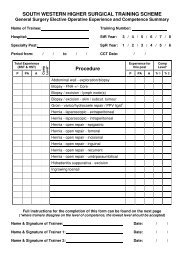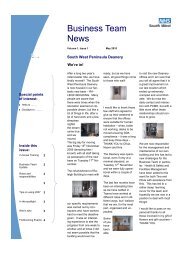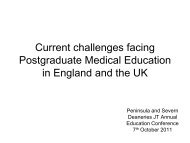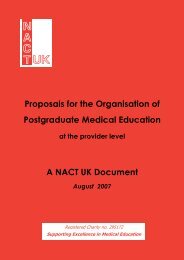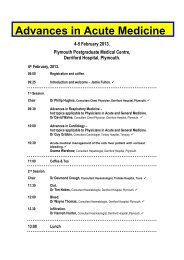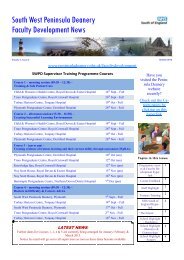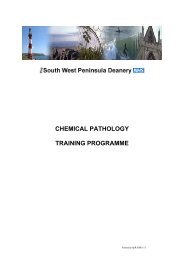Trainee Case Study - South West Peninsula Deanery
Trainee Case Study - South West Peninsula Deanery
Trainee Case Study - South West Peninsula Deanery
Create successful ePaper yourself
Turn your PDF publications into a flip-book with our unique Google optimized e-Paper software.
<strong>South</strong> <strong>West</strong> <strong>Peninsula</strong> <strong>Deanery</strong><br />
Career Planning Service<br />
Stroke Medicine – <strong>South</strong> <strong>West</strong> <strong>Peninsula</strong> <strong>Trainee</strong> <strong>Case</strong> <strong>Study</strong><br />
Dr Paul Mudd – Specialty <strong>Trainee</strong><br />
Your background prior to studying medicine<br />
I went to medical school aged 18, straight after A-levels.<br />
The reason for choosing Stroke Medicine<br />
I felt many of the hospital specialties had become rather narrow, but Geriatricians still<br />
enjoyed the fusion of acute general medicine with complex, long term diseases and<br />
rehabilitation. I did all the medical specialties as an SHO and found Geriatrics to be best<br />
suited to an ‘all-rounder’. Although Stroke medicine is a specialty largely within Geriatrics<br />
and treats a similar group of patients with a similar ethos, a smaller number of young<br />
patients are treated too.<br />
A stroke is often a life-changing event for a patient and their family and the decisions you<br />
make will be important to them. It’s a rapidly developing and expanding field with recent<br />
extra funding from central government. The doctor is part of a large, multidisciplinary team,<br />
so there are other interesting professionals to interact with. It’s a friendly specialty with a<br />
healthy mix of people, the doctors being usually from a geriatric or neurology background.<br />
You also need to know about surgical techniques, radiology, psychology and general<br />
cardiovascular medicine too. There are good opportunities for research and travel.<br />
The reality of working in Stroke Medicine as a trainee doctor<br />
Many other conditions can mimic a stroke, so it’s important to keep an open mind and have<br />
knowledge of alternative diagnoses. Most stroke patients have additional illnesses that limit<br />
or delay their recovery and you need to know how to manage these. Patience and<br />
explanation are needed. Many are left with disability and helping them to cope is a challenge<br />
which can still feel rewarding. This will take all your communication and teamwork skills.<br />
Some patients die from their stroke and you’ll need to be able to cope with all aspects of<br />
palliative care.<br />
Out-patient clinics involve seeing new strokes (or their mimics) and aim to prevent further<br />
strokes and heart disease. You’ll need to keep up to date with all aspects of cardiovascular<br />
medicine and basic neuroscience.<br />
Daily activities and responsibilities<br />
<br />
<br />
<br />
<br />
Seeing acute strokes in A&E and other wards and assisting with thrombolysis.<br />
Ward rounds with the junior doctors and case conferences to plan rehabilitation with<br />
the relevant therapists.<br />
Out-patient stroke clinics allow us to see people with potential strokes quickly and<br />
there are now good services to provide same-day scans and treatment.<br />
We follow patients through to their community hospital as they undergo rehabilitation<br />
and get ready to go home.<br />
Updated April 2009 Page 1<br />
I:\Careers Planning\Careers Information\A-Z Careers Information Sheets\Stroke<br />
Medicine\Approved by CateAugust09\Stroke_Medicine_<strong>Trainee</strong>_<strong>Case</strong><strong>Study</strong>_August09.doc
I spend time teaching students and staff and communicating with GPs and families,<br />
performing audit and research, time for self-study and visiting other departments.<br />
Attending local and national meetings to learn and interact with colleagues.<br />
Suggestions for personal development and managing change<br />
Firstly, gain a sound knowledge and experience of general medicine. Most stroke doctors<br />
will still do on-calls for the acute medical ‘take’, having passed the Royal College of<br />
Physicians exam. Develop good teamwork and communication skills. You’ll need to cope<br />
with diverse patterns of work, some patients being very sick and some relatively well. The<br />
hours can be long and physically demanding, but are improving and there are opportunities<br />
to work part-time.<br />
Ways to achieve a successful work-life balance<br />
Doctors have more leisure time than before, so keep in contact with all your non-medical<br />
friends and make the most of your holidays. Keep fit by any means possible and have a few<br />
hobbies. Develop an enquiring mind and enjoy your study leave and meetings.<br />
Snapshot of your career path to date<br />
I did six years of hospital medicine, experiencing all the major specialties and on-calls and<br />
sitting the MRCP exams. I felt I’d gained a broad education at the ‘sharp end’ after this. Then<br />
I spent a year as a stroke research associate and a year in New Zealand as a medical<br />
registrar.<br />
After choosing Geriatrics I was accepted as a registrar with additional training and on-calls in<br />
general medicine. I’m now doing a year of Stroke Medicine as part of a Department of Health<br />
initiative to formalise stroke training and gain a new Certificate of Specialist Training in<br />
Stroke (CCT).<br />
Career goals for the future<br />
I’m aiming to pass the certificate of training in Stroke, publish a further research article and<br />
become a Consultant in a few years<br />
Updated April 2009 Page 2<br />
I:\Careers Planning\Careers Information\A-Z Careers Information Sheets\Stroke<br />
Medicine\Approved by CateAugust09\Stroke_Medicine_<strong>Trainee</strong>_<strong>Case</strong><strong>Study</strong>_August09.doc



